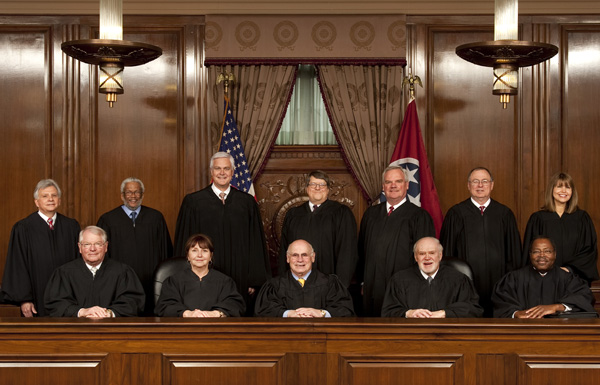Deliberative process privilege danger to open government

Court of Appeals judges are (seated from left), David R. Farmer, Patricia J. Cottrell, Charles D. Susano, Jr., Alan E. Highers, John Westley McClarty; (standing from left) J. Steven Stafford, Richard H. Dinkins, Thomas R. Frierson, II, Andy D. Bennett, Frank G. Clement, D. Michael Swiney, and Holly M. Kirby.
From the Knoxville News-Sentinel:
A recent Tennessee appeals court ruling explicitly established for the first time an exemption to the state’s Public Records Act for documents used by “high officials” in developing policy.
The broadly written ruling could allow any government official to refuse to release just about any document to a citizen seeking to review them. The decision contains chilling implications for open government in Tennessee and should be reversed if reviewed by the state Supreme Court.
The case originated in Davidson County, where in 2005 a man named Karl Davidson participated in a 77-day sit-in at the Tennessee State Capitol to protest cuts to TennCare, the state’s Medicaid program. Davidson alleges former Gov. Phil Bredesen and former Deputy Gov. David Cooley directed Tennessee Highway Patrol officers to harass and intimidate the protesters.
As part of the discovery process, Davidson’s lawyers sought notes made at various times by the governor’s legal team. Lawyers for Bredesen and Cooley argued they did not have to turn over the notes, citing attorney-client privilege and arguing the notes were covered by “the deliberative process.”
The trial judge dismissed the case, which then was appealed to the state Court of Appeals. Written by Appeals Court Judge Richard Dinkins and joined by judges Patricia J. Cottrell and Frank G. Clement Jr., the appellate court decision upheld the trial court’s ruling that most of the documents were covered under the attorney-client privilege.
But the appeals court judges went further, establishing a “deliberative process privilege” that shields records of policymakers. The court noted that the deliberative process privilege is based in common law and that previous rulings had implicitly recognized its use, particularly for the governor.
In its ruling, however, the Court of Appeals broadened it to include others: “The officials who are able to claim the privilege are those vested with the responsibility of developing and implementing law and public policy, many times requiring that differing and various interests and viewpoints be considered.”
The ruling goes on to state that an official’s relationship with trusted advisors justifies a limitation on the availability of public documents. The judges, however, do not identify which offices can invoke the privilege or what types of documents can be withheld under its protection.
It is no stretch of the imagination to envision a city or county mayor refusing to release a traffic study about a dangerous intersection or a negative feasibility study about a pet public project, claiming that the documents were used to formulate policy. Litigation over an official’s right to invoke the privilege and the documents protected by it could clog courtrooms for years.
If the state Supreme Court has the opportunity to review the lower court’s decision, it should reverse that portion of the ruling. Failing that, the High Court should severely restrict the use of the deliberative process privilege to preserve the public’s right to review public documents as guaranteed by the Tennessee Public Records Act.
(This editorial, published by the Knoxville News-Sentinel on Nov. 14, was reprinted with permission.)

